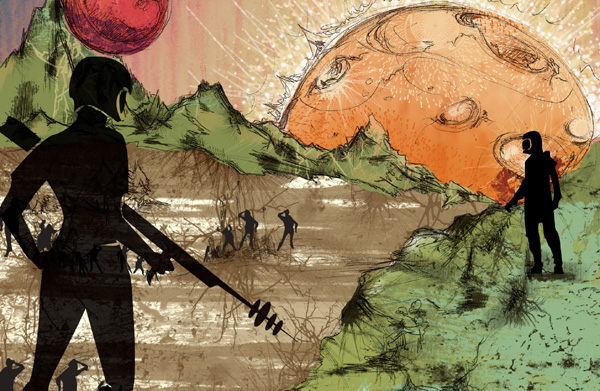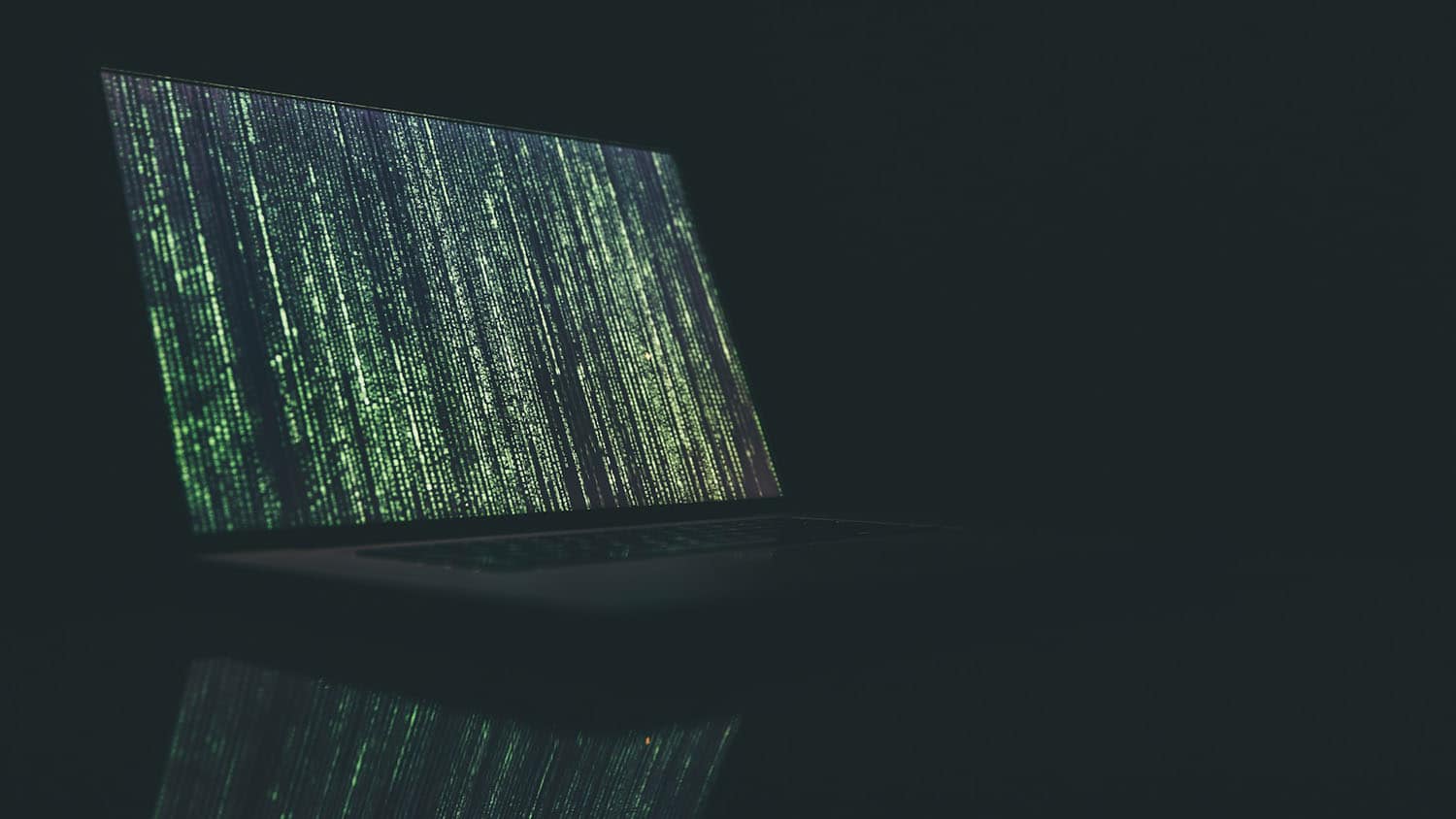Events Preceding the Helvetican Renaissance (Part I)

Editor’s Note: Readers of The Abstract are generally interested in research, science and technology. People who fall into that camp are often also devotees of science fiction. So, in a throwback to the serialized storytelling of the golden age of sci-fi, we decided to serialize some science fiction by one of our favorite authors – John Kessel. Kessel is a two-time Nebula award winner and a professor of English at NC State. New installments will come out every week for five weeks. “Events Preceding the Helvetican Renaissance” is copyright 2009 by John Kessel. Enjoy!
When my mind cleared, I found myself in the street. The protector god Bishamon spoke to me then: The boulevard to the spaceport runs straight up the mountain. And you must run straight up the boulevard.
The air was full of wily spirits, and moving fast in the Imperial City was a crime. But what is man to disobey the voice of a god? So I ran. The pavement vibrated with the thunder of the great engines of the Caslonian Empire. Behind me the curators of the Imperial Archives must by now have discovered the mare’s nest I had made of their defenses, and perhaps had already realized that something was missing.
Above the plateau the sky was streaked with clouds, through which shot violet gravity beams carrying ships down from and up to planetary orbit. Just outside the gate to the spaceport a family in rags—husband, wife, two children—used a net of knotted cords to catch fish from the sewers. Ignoring them, prosperous citizens in embroidered robes passed among the shops of the port bazaar, purchasing duty-free wares, recharging their concubines, seeking a meal before departure. Slower, now.
I slowed my pace. I became indistinguishable from them, moving smoothly among the travelers.
To the Caslonian eye, I was calm, self-possessed; within me, rage and joy contended. I had in my possession the means to redeem my people. I tried not to think, only to act, but now that my mind was rekindled, it raced. Certainly it would go better for me if I left the planet before anyone understood what I had stolen. Yet I was very hungry, and the aroma of food from the restaurants along the way enticed me. It would be foolishness itself to stop here.
Enter the restaurant, I was told. So I stepped into the most elegant of the establishments.
The maitre’d greeted me. “Would the master like a table, or would he prefer to dine at the bar?”
“The bar,” I said.
“Step this way.” There was no hint of the illicit about his manner, though something about it implied indulgence. He was proud to offer me this experience that few could afford.
He seated me at the circular bar of polished rosewood. Before me, and the few others seated there, the chef grilled meats on a heated metal slab. Waving his arms in the air like a dancer, he tossed flanks of meat between two force knives, letting them drop to the griddle, flipping them dexterously upward again in what was as much performance as preparation. The energy blades of the knives sliced through the meat without resistance, the sides of these same blades batting them like paddles. An aroma of burning hydrocarbons wafted on the air.
An attractive young man displayed for me a list of virtualities that represented the “cuts” offered by the establishment, including subliminal tastes. The “cuts” referred to the portions of the animal’s musculature from which the slabs of meat had been sliced. My mouth watered.
He took my order, and I sipped a cocktail of bitters and Belanova.
While I waited, I scanned the restaurant. The fundamental goal of our order is to vindicate divine justice in allowing evil to exist. At a small nearby table, a young woman leaned beside a child, probably her daughter, and encouraged her to eat. The child’s beautiful face was the picture of innocence as she tentatively tasted a scrap of pink flesh. The mother was very beautiful. I wondered if this was her first youth.
The chef finished his performance, to the mild applause of the other patrons. The young man placed my steak before me. The chef turned off the blades and laid them aside, then ducked down a trap door to the oubliette where the slaves were kept. As soon as he was out of sight, the god told me, Steal a knife.
While the diners were distracted by their meals, I reached over the counter, took one of the force blades, and slid it into my boot. Then I ate. The taste was extraordinary. Every cell of my body vibrated with excitement and shame. My senses reeling, it took me a long time to finish.
A slender man in a dark robe sat next to me. “That smells good,” he said. “Is that genuine animal flesh?”
“Does it matter to you?”
“Ah, brother, calm yourself. I’m not challenging your taste.”
“I’m pleased to hear it.”
“But I am challenging your identity.” He parted the robe—his tunic bore the sigil of Port Security. “Your passport, please.”
I exposed the inside of my wrist for him. A scanlid slid over his left eye and he examined the marks beneath my skin. “Very good,” he said. He drew a blaster from the folds of his cassock. “We seldom see such excellent forgeries. Stand up, and come with me.”
I stood. He took my elbow in a firm grip, the bell of the blaster against my side. No one in the restaurant noticed. He walked me outside, down the crowded bazaar. “You see, brother, that there is no escape from consciousness. The minute it returns, you are vulnerable. All your prayer is to no avail.”
This is the arrogance of the Caslonian. They treat us as non-sentients, and they believe in nothing. Yet as I prayed, I heard no word.
I turned to him. “You may wish the absence of the gods, but you are mistaken. The gods are everywhere present.” As I spoke the plosive “p” of “present,” I popped the cap from my upper right molar and blew the moondust it contained into his face.
The agent fell writhing to the pavement. I ran off through the people, dodging collisions. My ship was on the private field at the end of the bazaar. Before I had gotten half way there, an alarm began sounding. People looked up in bewilderment, stopping in their tracks. The walls of buildings and stalls blinked into multiple images of me. Voices spoke from the air: “This man is a fugitive from the state. Apprehend him.”
I would not make it to the ship unaided, so I turned on my perceptual overdrive. Instantly, everything slowed. The voices of the people and the sounds of the port dropped an octave. They moved as if in slow motion. I moved, to myself, as if in slow motion as well—my body could in no way keep pace with my racing nervous system—but to the people moving at normal speed, my reflexes were lighting fast. Up to the limit of my physiology—and my joints had been reinforced to take the additional stress, my muscles could handle the additional lactic acid for a time—I could move at twice the speed of a normal human. I could function perhaps for ten minutes in this state before I collapsed.
The first person to accost me—a sturdy middle aged man—I seized by the arm. I twisted it behind his back and shoved him into the second who took up the command. As I dodged through the crowd up the concourse, it began to drizzle. I felt as if I could slip between the raindrops. I pulled the force blade from my boot and sliced the ear from the next man who tried to stop me. His comic expression of dismay still lingers in my mind. Glancing behind, I saw the agent in black, face swollen with pustules from the moondust, running toward me.
I was near the field. In the boarding shed, attendants were folding the low-status passengers and sliding them into dispatch pouches, to be carried onto a ship and stowed in drawers for their passage. Directly before me, I saw the woman and child I had noticed in the restaurant. The mother had out a parasol and was holding it over the girl to keep the rain off her. Not slowing, I snatched the little girl and carried her off. The child yelped, the mother screamed. I held the blade to the girl’s neck. “Make way!” I shouted to the security men at the field’s entrance. They fell back.
“Halt!” came the call from behind me. The booth beside the gate was seared with a blaster bolt. I swerved, turned, and, my back to the gate, held the girl before me.
The agent in black, followed by two security women, jerked to a stop. “You mustn’t hurt her,” the agent said.
“Oh? And why is that?”
“It’s against everything your order believes.”
Master Darius had steeled me for this dilemma before sending me on my mission. He told me, “You will encounter such situations, Adlan. When they arise, you must resolve the complications.”
“You are right!” I called to my pursuers, and threw the child at them.
The agent caught her, while the other two aimed and fired. One of the beams grazed my shoulder. But by then I was already through the gate and onto the tarmac.
A port security robot hurled a flame grenade. I rolled through the flames. My ship rested in the maintenance pit, cradled in the violet anti-grav beam. I slid down the ramp into the open airlock, hit the emergency close, and climbed to the controls. Klaxons wailed outside. I bypassed all the launch protocols and released the beam. The ship shot upward like an apple seed flicked by a fingernail; as soon as it had hit the stratosphere, I fired the engines and blasted through the scraps of the upper atmosphere into space.
The orbital security forces were too slow, and I made my escape.
- Categories:


